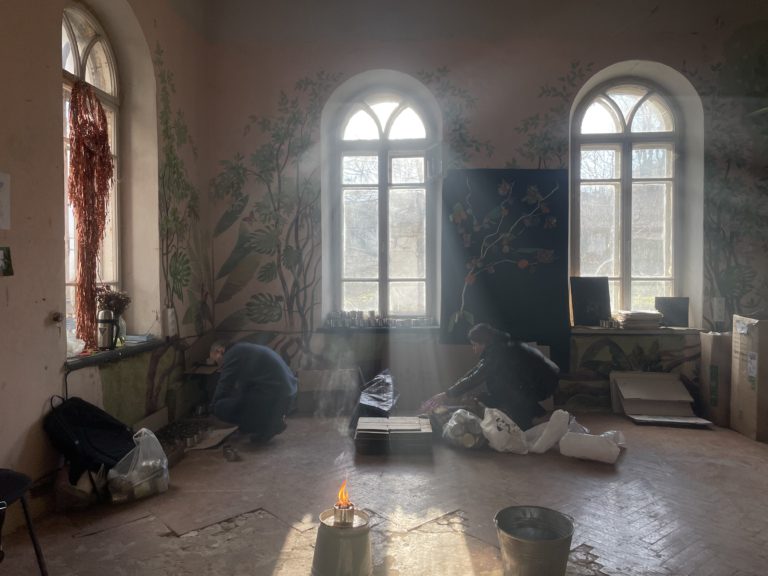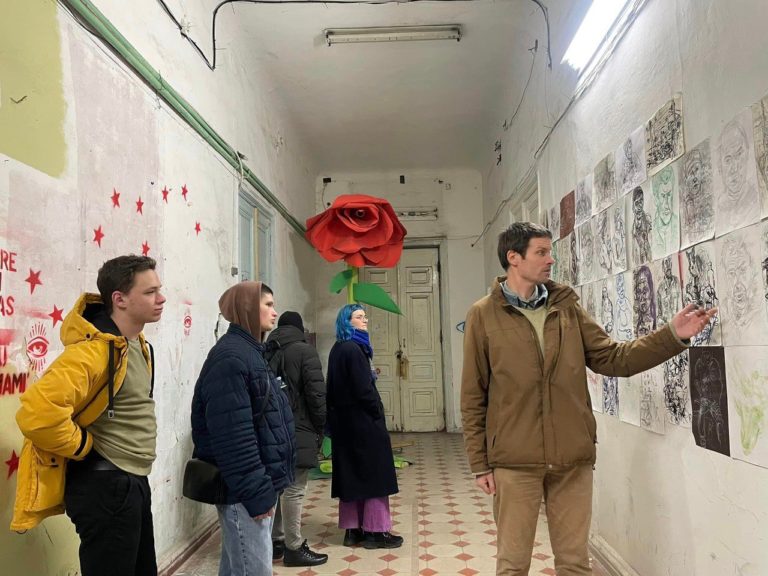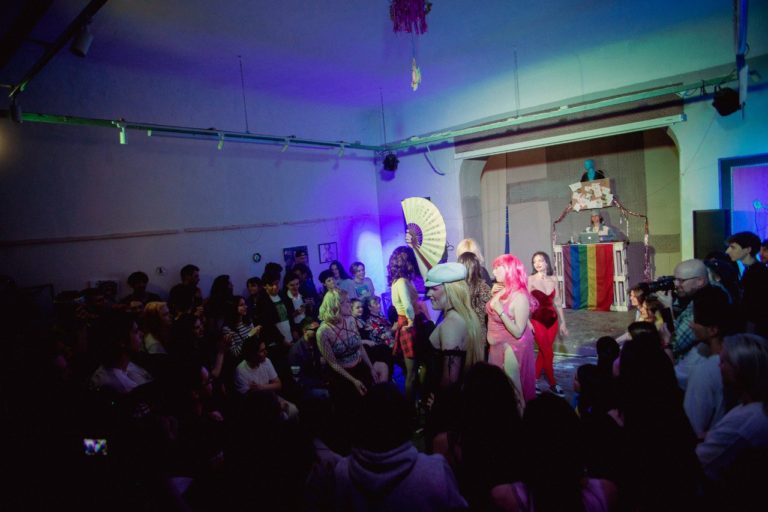Author: Rusanda Alexandru Curcă
The reality faced by the members of the independent cultural sector in the Republic of Moldova over the last three decades has been characterised by a constant and acute lack of funding, lack of spaces and infrastructure, precariousness, absence of cultural strategies and policies that would encourage and support the development of the sector and its recognition as an essential actor in the social and economic development of the State. Until now, cultural life has revolved around government institutions. These institutions, beholden to central and local authorities, function primarily as instruments for the perpetuation of national values. The government acts as its own cultural gatekeeper, organising activities that conform to its own hierarchical, top-down approach. All initiatives that challenge the status quo are discouraged.

Art Studio in Casa Zemstvei – © Marina Scaletchi
Top-down Dynamic and Prevalence of Culture as an Industry
State institutions often operate out of inertia in a formal and self-serving logic–politically influenced, they appear anachronistic in relation to current social problems ( corruption, polarisation, corporate labour exploitation, domestic violence, homophobia and discrimination, poor education and health systems, inequity, migration, etc.), .
If in the EU countries the average funding for culture is around 1% of GDP, and in some countries it reaches up to 3%, in the Republic of Moldova since 2009, when we reached 1% of GDP, it has been continuously decreasing, reaching 0,70% of GDP in 2023. The tendency of the current government is to turn cultural policy into industry policy. Its main discourse is: “In the Republic of Moldova, creative industries are a fundamental driving force for a sustainable future. With the support of the government, Moldova's creative industries are showing talent and willingness to play a transformative role in the future of the country's population.”
The State is creating opportunities for the representatives of the creative industries, giving them access to public infrastructure, developing policies and strategies. The National Programme for the Development of Creative Industries "Creative Moldova 2024-2027” states that State institutions often fail to differentiate between culture and the creative industries, assigning to the industries roles that belong strictly to the public and independent cultural sectors as a public service, a generator of values and an instrument of civic education, a catalyst of solidarity and social cohesion, and not to culture as an industry/commodity to be exploited for profit. In the absence of a clear distinction between these sectors, the cultural and artistic field, which has a symbolic, social, and non-commercial value, is being merged with a sector that is valued for its economic and, above all, commercial value.
In 2019, in order to give a national-scale value and representation to culture as an independent sector, a group of initiatives sent a request for the establishment of a National Centre for Contemporary Art and Culture, established in the Casa Zemstvei building. This request remained unanswered.
The Lack of Spaces as a Fundamental Issue
However, in addition to a lack of funding and recognition from the State, the lack of rehearsal, production, and presentation spaces, be it a performance hall, a cinema, or a gallery, is one of the most fundamental problems that the independent scene in Moldova has been facing for many years.
The building of the Casa Zemstvei or Zemstva House in Chișinău has become an important centre of independent culture in Moldova in recent years.
The building is a former orphanage, later the headquarters of the Russian Empire Bessarabian Governorate, and later still the Faculty of Agronomy. After the collapse of the Soviet Union in 1991, the building was left unused, and in 2010 it came under the administration of the Museum of Ethnography, which uses some of its rooms to store its collections. In 2012, the Oberliht Association rented it for the activities of the Tandem Festival and began to activate it on a regular basis, even though there was no electricity and the space was in very precarious conditions.

Corridor in Casa Zemstvei – © Marina Scaletchi
Nowadays, more than 10 independent organisations and initiatives are currently active in this cultural centre, including Oberliht (art and public space), Rhythms of Resistance Chișinău (civic activism), Coalition of Independent Cultural Sector, Bike Studio, 3rd Space Studio, ZAO Theatre, Art Studio, Queer Cafe, Art Platforma (photography), Free Shop, etc.
Each year these initiatives organise around 150 events with the participation of over 8,000 people, offering a diverse programme ranging from exhibitions, film festivals, readings, concerts by local and foreign musicians, performances, to debates, workshops, lectures, and summer schools. Around 10 artists, environmental and sports collectives also regularly work in these spaces.
Casa Zemstvei is still in very precarious conditions, with no heating system and a leaking roof, but it is still the only place of its kind in the Republic of Moldova. The independent organisations that are active in the building have had to carry out repairs to make the premises functional, install the electricity system, repair the toilets, etc., without any support from State institutions.
In addition, under these conditions, the residents have a one-year contract that has to be renewed every year, leaving the organisations without the opportunity to think and create a long-term vision and a sustainable model for the development of the space. Furthermore, the Zemstvei community is at risk of being left without a space year after year because the Museum of Ethnography (MofE), the space's manager, does not want to renew the contracts for one reason or another. These organisations have had to negotiate annually with the MofE administration to secure access to the cultural infrastructure necessary for a very large number of non-commercial organisations, cultural initiatives, and emerging artists to carry out their activities, which has led to constant instability and uncertainty for projects and activities.
At the end of 2020, residents received eviction notices and were faced with the possibility of being evicted from a space where they had been active for years. The community organised large-scale protest–a rally in front of the government on January 31st, 2024 and a parade through the city centre of Zemstvei initiatives on February 1st, 2024. At the same time, an online petition was launched, gathering over 1,600 signatures.
At the end of 2022, other meetings were organised with the Ministry of Culture to negotiate the contracts, because of the reluctance of the MofE to extend them. Aligned with our 2019 proposal, The Ministry of Culture then expressed their wish to create a centre for contemporary art and culture, and that Zemstvei could be one of the potential buildings to house it. They asked the residents to map their needs and to propose a model for Casa Zemstvei. We worked for a year on a participatory governance model for culture and contributed to the design of a new legal framework for public infrastructure management in the Republic of Moldova.
Despite these efforts, in 2024, the Ministry of Culture along with the MofE informed us that the Museum intended to start restoration work on the building and use it for its own purposes, without considering the possibility of creating a shared vision and implementing the model that we'd developed.
With this turnaround, we are no longer sure of being able to stay in Casa Zemstvei until the end of the year, as we could be evicted at any time. We have stated that the organisations that have maintained Casa Zemstvei over the past ten years, investing energy, creativity, financial resources, countless hours of underpaid, unpaid, and voluntary work, are as legitimate to be there as the MofE administration, and have as much right to continue their work uninterrupted, their needs just as viable as the needs of the museum.
Despite its uncertain future, Casa Zemstvei remains one of the few spaces dedicated to independent culture in Chișinău, with a history of over a decade of activity, and has come to function as an independent cultural platform based on inclusion, openness, accessibility, and self-organisation. Its cultural activities and activist actions are rooted in a critical, educational, and accessible artistic practice, which in turn empowers a diverse, educated, civically engaged audience, builds an artistic community and, last but not least, offers a new understanding of the role that culture and civic engagement can play in Moldova.

Queer Cafe in Casa Zemstvei – © Queer Cafe
What Kind of Cultural Sector Do We Want?
On March 28th, Minister of Culture Sergiu Prodan announced the project for the creation of the “Universul” Centre for Culture and Contemporary Art in the building of the former Universul Publishing House on Vlaicu Pîrcălab Street in Chișinău, which is 22,000 square metres, and can accommodate a large variety of actors from the independent, public, and private sectors.
At last, our work, plans, and dreams were coming true. We were eager to contribute both to the creation of a concept for the institution that would respond to local needs and visions, and to the form of governance of this new institution, based on European models of public participation, for the benefit of the non-profit cultural scene and local communities.
But at the same conference, the Minister of Culture said that the sum needed to implement the project would be 10 to 15 million euros, the money the government had identified from the sale of the site of the former Republican Stadium for the future headquarters of the US Embassy in Moldova. And that ruined all our excitement.
Over the course of a decade, the sale of the Republican Stadium site to the US Embassy has been handled by successive corrupt governments that have tried to alienate it in a non-transparent manner. Several civic initiatives, community groups, and public figures have expressed their desire for both the central government and the US Embassy to ensure transparency and citizen participation in the decision-making process. President Maia Sandu publicly promised to ensure broad discussions with society and interested groups. These broad discussions and consultations with society have not taken place.
At the same time, we distinguish the two separate issues: the development of the former Universul Publishing House to meet the needs and projects of the cultural sector, and the demolition of the former Republican Stadium. We have publicly expressed our concern that the rehabilitation of the building of the future Centre for Culture and Contemporary Art “Universul”, according to the Minister’s statements, will take place on the basis of the demolition of another important public asset, a monument of culture, sport, and collective memory, located in the historical centre of the city, and we reject any attempt to instrumentalise contemporary art for political and private interests–i.e. artwashing, wanting to legitimise the untransparent and problematic selling of the Republican Stadium, by renovating a space for the independent cultural sector.
The question is whether the independent cultural players want to be residents of a building renovated according to artwashing principles. What about the principles and values that are guiding us in our work like self-organisation, non-hierarchy, transparency, collaboration, solidarity etc.? We definitely need spaces to create and nurture our communities. We definitely want to co-create new models of institutional design in which citizens can develop new values through the collective exercise of their constituent power. We need this and we will demand it, but it is essential that all the principles and values of a healthy democracy are respected and applied. That is the future we seek.
Published on July 11th, 2024
About the author:
Rusanda Alexandru Curcă is a rural DJ and producer, cultural and community worker, environmental and civic activist based in Hîrtop village, Republic of Moldova. She is the co-director of the Center for Cultural Projects Arta Azi and the director of the Coalition of the Independent Cultural Sector from the Republic of Moldova, an umbrella organisation that unites the representatives of the independent cultural scene aiming at improving the legislation in the field of culture through advocacy activities.